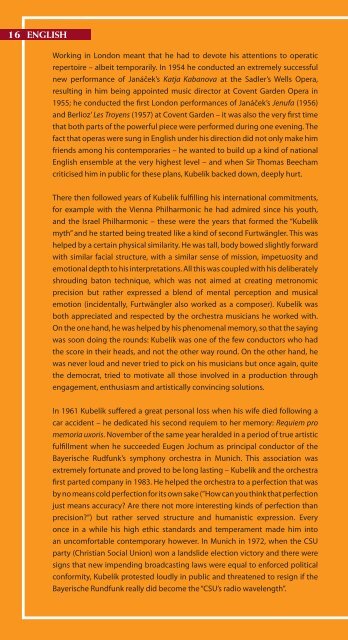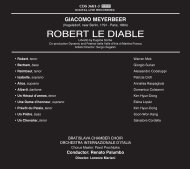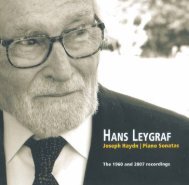RAFAEL KUBELÍK
RAFAEL KUBELÍK
RAFAEL KUBELÍK
Erfolgreiche ePaper selbst erstellen
Machen Sie aus Ihren PDF Publikationen ein blätterbares Flipbook mit unserer einzigartigen Google optimierten e-Paper Software.
16 ENGLISH<br />
Working in London meant that he had to devote his attentions to operatic<br />
repertoire – albeit temporarily. In 1954 he conducted an extremely successful<br />
new performance of Janáček’s Katja Kabanova at the Sadler’s Wells Opera,<br />
resulting in him being appointed music director at Covent Garden Opera in<br />
1955; he conducted the first London performances of Janáček’s Jenufa (1956)<br />
and Berlioz’ Les Troyens (1957) at Covent Garden – it was also the very first time<br />
that both parts of the powerful piece were performed during one evening. The<br />
fact that operas were sung in English under his direction did not only make him<br />
friends among his contemporaries – he wanted to build up a kind of national<br />
English ensemble at the very highest level – and when Sir Thomas Beecham<br />
criticised him in public for these plans, Kubelík backed down, deeply hurt.<br />
There then followed years of Kubelík fulfilling his international commitments,<br />
for example with the Vienna Philharmonic he had admired since his youth,<br />
and the Israel Philharmonic – these were the years that formed the “Kubelík<br />
myth” and he started being treated like a kind of second Furtwängler. This was<br />
helped by a certain physical similarity. He was tall, body bowed slightly forward<br />
with similar facial structure, with a similar sense of mission, impetuosity and<br />
emotional depth to his interpretations. All this was coupled with his deliberately<br />
shrouding baton technique, which was not aimed at creating metronomic<br />
precision but rather expressed a blend of mental perception and musical<br />
emotion (incidentally, Furtwängler also worked as a composer). Kubelík was<br />
both appreciated and respected by the orchestra musicians he worked with.<br />
On the one hand, he was helped by his phenomenal memory, so that the saying<br />
was soon doing the rounds: Kubelík was one of the few conductors who had<br />
the score in their heads, and not the other way round. On the other hand, he<br />
was never loud and never tried to pick on his musicians but once again, quite<br />
the democrat, tried to motivate all those involved in a production through<br />
engagement, enthusiasm and artistically convincing solutions.<br />
In 1961 Kubelík suffered a great personal loss when his wife died following a<br />
car accident – he dedicated his second requiem to her memory: Requiem pro<br />
memoria uxoris. November of the same year heralded in a period of true artistic<br />
fulfillment when he succeeded Eugen Jochum as principal conductor of the<br />
Bayerische Rudfunk’s symphony orchestra in Munich. This association was<br />
extremely fortunate and proved to be long lasting – Kubelík and the orchestra<br />
first parted company in 1983. He helped the orchestra to a perfection that was<br />
by no means cold perfection for its own sake (”How can you think that perfection<br />
just means accuracy? Are there not more interesting kinds of perfection than<br />
precision?”) but rather served structure and humanistic expression. Every<br />
once in a while his high ethic standards and temperament made him into<br />
an uncomfortable contemporary however. In Munich in 1972, when the CSU<br />
party (Christian Social Union) won a landslide election victory and there were<br />
signs that new impending broadcasting laws were equal to enforced political<br />
conformity, Kubelík protested loudly in public and threatened to resign if the<br />
Bayerische Rundfunk really did become the “CSU’s radio wavelength”.

















